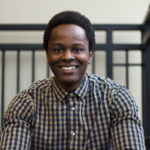On Monday, April 7, Asbury’s own Professor Sean Gaffney explored the connection between theology and screenwriting through the release of his new book “Meta Story: What Marvel & the Messiah Can Teach Us About Great Storytelling.”
As a professor of screenwriting and associate dean for Asbury’s School of Communication Arts, Gaffney spends much of his time teaching how to tell impactful stories from a distinctly Christian perspective. This passion of Gaffney’s formed the foundation of “Meta Story,” which centers around connecting these two core values.
“It is about how to write scripts in great detail,” said Gaffney. “It is about how to read stories in great detail. And it is the theological reasons [behind] why everything that goes into how you write a script, read a script or experience a story is from God.”
In going about this process, Gaffney presents various stories from the Bible and secular culture. Rather than showing how different they are, however, Gaffney focuses on just how similar they are, looking to universal forms and themes to show a higher source of what exactly makes a good story.
“Everything in story structure, from how humans expect to receive story to the form that story comes in… is hardwired into us,” said Gaffney. “The thesis of the book is that the reason we’re hardwired for that is because that form helps draw us towards God. Therefore, in every story that we read or watch, we’re actually looking for God through that structure.”
According to his book, this reality is true not only in the plot dynamics of great stories but in characters and character arcs as well. This part of the book inspired the mention of Marvel in the title as, according to Gaffney, one of the best examples of this connection in modern media.
“In early Marvel movies, what mattered was always strength of character,” explained Gaffney. “So because Spider-Man was willing to sacrifice himself for the love of his enemy, and because Thor was willing to humble himself, they end up winning. And the tragedies are always a failure of character. Because Iron Man cannot let go of vengeance, Captain America Civil War ends as a tragedy. And because Thor is seeking vengeance and Star-Lord is not able to let go of his anger, Infinity War is a tragedy… They’re losing their individual battles because their character strength is too weak. We can take the Marvel movies, look at it through a Christ lens, and we can see these very obvious storytelling principles.”
Though the book only released this week, the idea of writing on these principles has been a long time in the making for Gaffney. After writing on a similar topic for his master’s thesis, the notion developed into something more after one occasion of him speaking on the issue.
“This book started officially somewhere in the early 2000s when my friend Bob Lee, [who heard] me give a lesson on story structure to our church drama group, said ‘that’s got to be a book,’” recounted Gaffney. “It has been a hard book to find a publisher for because it seems so niche and yet so universal, so we went the self-publishing route.”
In spite of being self-published, “Meta Story” was added to by several other important creatives. On top of featuring comically engaging illustrations by Bryan Ballinger, the book contains two forewords by Dean Batali and David Guyartson, a major television writer and former Asbury president, respectively. Together, their two voices help to represent Gaffney’s vision for the book of helping readers better understand stories as a whole, but God’s bigger one as well.
“I hope that readers read their Bible differently because they understand story,” said Gaffney. “I hope it will surprise them because they’re seeing characters living out a story as opposed to reading the Bible as a list of laws. I hope the Bible becomes more of a living document for them.”
“Meta Story: What Marvel & the Messiah Can Teach Us About Great Storytelling” is available for purchase in ebook or print on Amazon and GaffneyInkwell.com.
Article written by Sabina Boyer.
Photo courtesy of Asbury University.




